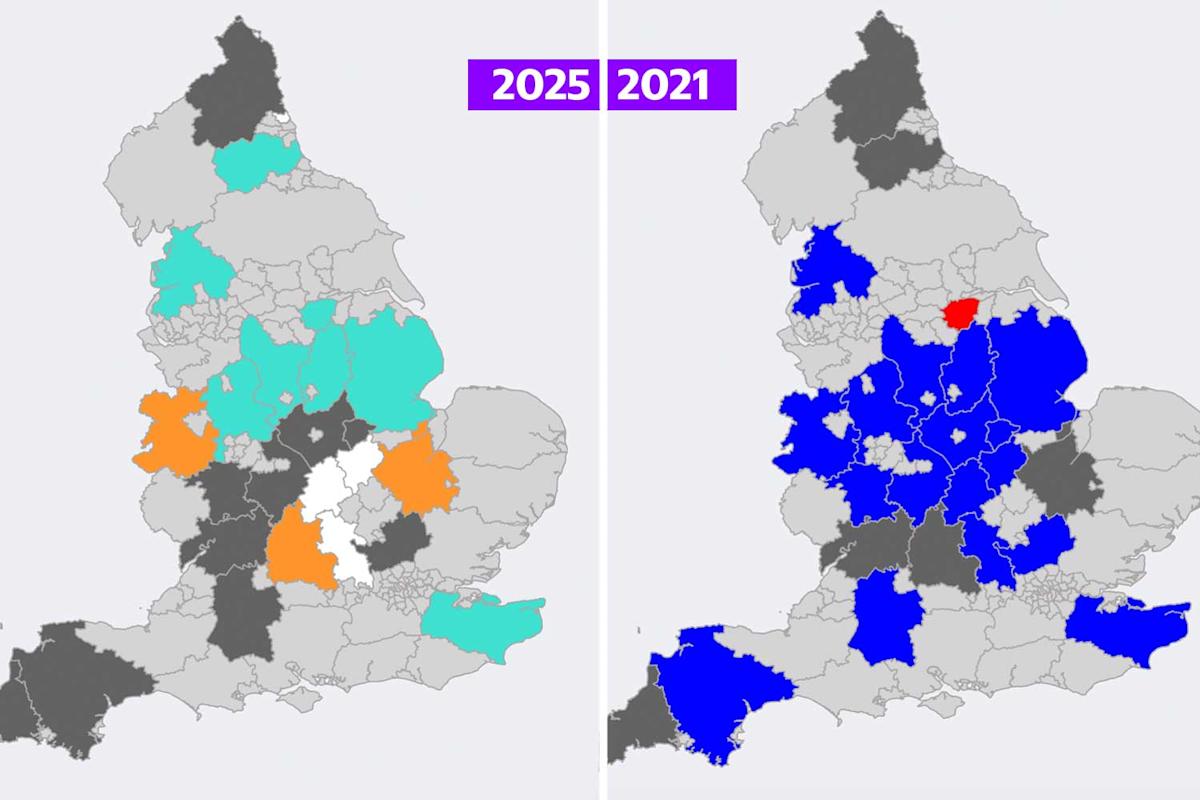Nigel Farage’s Reform UK is “in business” as an electoral force.
That’s the view of polling guru Sir John Curtice after Farage’s party took control of councils from the Tories and Labour and gained an MP in the Runcorn and Helsby by-election.
The professor told the BBC that before the elections, it would have been fair to question if it was “really true” Reform had emerged as a serious threat to Labour and the Tories, even with its positive opinion polling.
“I think we now already know that the answer to that question is ‘yes’. Reform are in business. They are a major challenge.”
But just how significant were the swings to Reform? How much damage was done to Labour and the Tories?
Local council results
Farage hailed Reform as “the main opposition party” after taking control of numerous councils for the first time, and winning hundreds of council seats across the country.
He taunted under-pressure Tory leader Kemi Badenoch after her party lost seats to Reform and the Liberal Democrats: “We want you to stay on as leader. I’ll put some money, if you’d like, to keep you there.”
The extraordinary scale of Tory losses to Reform can be seen in the likes of Kent, where it lost 51 council seats (from 56 to five); Lincolnshire, where the party lost 40 councillors (from 54 to 14); and Lancashire, where it was down 38 seats (from 46 to eight).
Reform also defeated Labour in its traditional heartlands: gaining Doncaster from Sir Keir Starmer’s party.
Toggle the map below to see the significant gains Reform has made from the Conservatives
Reform did not control any councils in England before these elections. Moreover, on three of the councils where Reform now has a majority, Derbyshire, Doncaster and Staffordshire, the party did not have a single councillor before polling day.
In a further three councils Reform are now the largest party, though short of a majority: Leicestershire, Warwickshire and Worcestershire, all of which were previously run by the Tories with majority control.
In Cambridgeshire the party won just 10 of the 61 seats up for grabs, while in Oxfordshire it managed to win only one seat.
The Liberal Democrats were the big winners in both of these councils, picking up enough seats to take full majority control.
The Lib Dems have also won a majority in Shropshire and are now the largest party in Devon, Gloucestershire, Hertfordshire and Wiltshire.
By contrast, the Conservatives have lost their majority in every council they were defending. Leader Sir Ed Davey said his party has now replaced the Conservatives as “the party of middle England”.
A snapshot of results after 20 of 23 councils have declared shows Reform on 593 seats, up 569 from before polling day; the Lib Dems on 336, up 132; the Conservatives on 241, down 499; Labour on 81, down 173; the Greens on 69, up 35; and independent candidates on 73, down 80.
Mayoral results
Of the six mayoral contests, two were new positions – and both were won by Reform.
Greater Lincolnshire was taken by former Tory MP Dame Andrea Jenkyns, while Hull & East Yorkshire was won by ex-boxer and London 2012 Olympic gold medallist Luke Campbell. The turnout in both polls was just 30%.
Labour held Doncaster, West of England and North Tyneside, while the Tories won Cambridgeshire and Peterborough from Labour: which the party described as a “significant win” after a “very difficult night.”
Runcorn by-election
Farage’s Reform UK secured a dramatic victory over Labour – by just six votes – in the only by-election contest of the night.
In one of the closest parliamentary contests ever, new MP Sarah Pochin took the Runcorn and Helsby seat which Labour has won with a majority of almost 15,000 less than a year ago.
Starmer conceded Labour’s loss was “disappointing” and insisted he was determined to go “further and faster” in delivering change.
The Runcorn and Helsby by-election ran alongside the local elections across England, having been triggered when former Labour MP Mike Amesbury quit after admitting punching a constituent.


